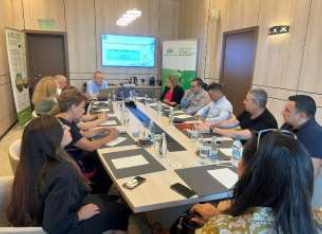Advancing Bioeconomy in Bulgaria: The Impact of the Regional Bioeconomy Hub - Plovdiv
The Regional Bioeconomy Hub – Plovdiv has made significant strides toward fostering sustainable economic development in Bulgaria’s Plovdiv region. At its first meeting for 2024, members of the Hub, led by prominent experts such as Prof. Vladislav Popov, reflected on past achievements and set ambitious goals for the future. The Hub’s role in promoting the bioeconomy, particularly through its collaboration with the BIOLOC project and the Municipality of Brezovo, continues to prove vital in strengthening the regional economy and empowering marginalized groups.
Building Capacity and Empowering Marginalized Communities
A key focus of the Hub’s efforts has been empowering marginalized groups such as low-income families, ethnic minorities, and seasonal agricultural workers. Thanks to a successful partnership with the Municipality of Brezovo, over 400 individuals from these groups have been provided with essential training in organic farming, entrepreneurial skills, and business management. This collaboration highlights the potential of bioeconomy initiatives to improve livelihoods, particularly in rural areas.
Prof. Vladislav Popov emphasized that these training programs are more than just skills-building efforts; they are part of a larger strategy to integrate marginalized populations into the regional bioeconomy. This approach benefits both the local economy and the individuals who participate, offering them new opportunities for stable employment and economic security.
Expanding Membership and Strengthening Partnerships
The Plovdiv Hub is also expanding its membership base, inviting private companies such as Summit Agro Bulgaria and research institutions like the University of Food Technology (UHT) Plovdiv to join its efforts. By fostering cross-sector partnerships, the Hub aims to create a network of actors in the bioeconomy—ranging from small and medium-sized enterprises (SMEs) to academic and research institutions—that can work collaboratively to drive regional innovation.
Partnerships with national and European organizations are also crucial to the Hub’s long-term success. Mrs. Karina Angelieva, a key voice in the Hub, stressed the importance of establishing relationships with European associations to position the Hub as a strong Southeast European partner. These partnerships will open doors to international funding opportunities, knowledge sharing, and the development of innovative bioeconomy projects.
Innovating in Bioeconomy Business Models
One of the most exciting developments within the Plovdiv Hub is the ongoing creation of new business models and technological solutions based on bioeconomy principles. These models are being designed to leverage the resources of local municipalities, such as the Municipality of Brezovo, where a new consultancy center for organic production has been established. By using bioeconomy to add value to local agricultural and food processing industries, the Hub is driving innovation and sustainability in the region.
The Strategic Vision for 2024 and Beyond
Looking ahead, the Regional Bioeconomy Hub – Plovdiv has set its sights on four main areas of focus: strategic planning and management of the bioeconomy, building capacity for bio-based industries, establishing a knowledge base, and developing bioeconomy business opportunities. Prof. Popov outlined these priorities during the meeting, underscoring the need to support the local ecosystem through training, innovation, and cross-sector collaboration.
A central element of this vision is the development of a comprehensive online platform, which will serve as a hub for information, resources, and collaboration among stakeholders. This digital resource will feature training modules, strategic documents, and work plans, making it easier for local actors to access the tools they need to succeed in the bioeconomy.
Enhancing Regional Impact
To further enhance its regional impact, the Plovdiv Hub is working closely with 18 municipalities in the Plovdiv area. By aligning with local governments, the Hub is able to develop tailored solutions that address the unique challenges and opportunities of the region. This collaboration is particularly important for supporting the integration of marginalized groups into the bioeconomy, as these communities are often most affected by economic changes and can benefit greatly from new opportunities in sustainable industries.
A Roadmap for the Future
To ensure continued success, Prof. Popov and his team are developing a detailed Roadmap for Future Development of the Hub. This roadmap will outline specific actions and goals, including the identification of key bio-based industries, the mapping of regional “natural capital,” and the development of innovative technological spaces for organic product processing.
The roadmap will also address the need for capacity building, particularly in terms of training and retaining young people in rural areas, and will emphasize the importance of sharing good practices across sectors and regions. The Plovdiv Hub is committed to creating a sustainable and inclusive bioeconomy that not only drives economic growth but also fosters social cohesion and environmental stewardship.
Conclusion
The Regional Bioeconomy Hub – Plovdiv is at the forefront of Bulgaria’s transition to a sustainable, bio-based economy. Through its innovative projects, strategic partnerships, and focus on empowering marginalized groups, the Hub is setting an example for how bioeconomy principles can be applied to create lasting positive change. As the Hub moves forward with its ambitious plans for 2024 and beyond, it is well-positioned to become a key player in both the national and European bioeconomy landscape.




